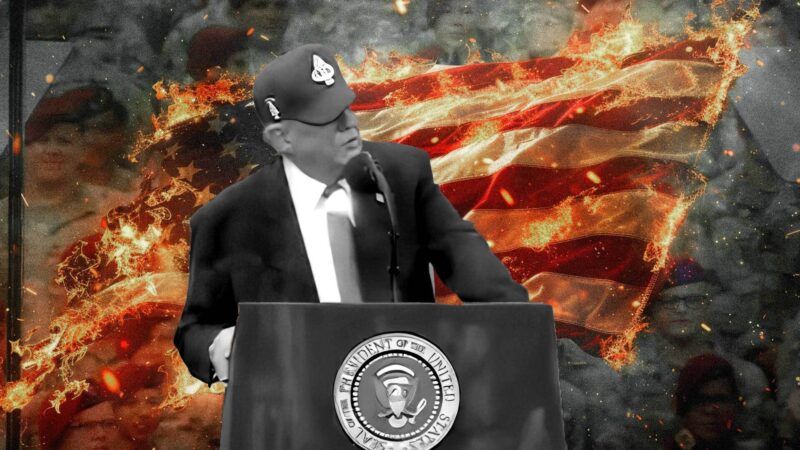Why Donald Trump and Josh Hawley Are Wrong To Call for Jailing People Who Burn the American Flag
The Supreme Court ruled decades ago that burning the flag is protected by the First Amendment, no matter how offensive that act may be.

One of the more relevant maxims today, particularly in the age of social media, is the fact that saying the same thing over and over again does not make it a reality. There are many people—across the political spectrum—who should internalize this.
President Donald Trump is one of them. While speaking at Fort Bragg on Tuesday, he re-upped an idea he has floated many times: "People that burn the American flag should go to jail for one year," he told a crowd of U.S. service members in a now-viral clip. "And we'll see if we can get that done."
They cannot, in fact, get that done.
Trump is, of course, entitled to oppose flag burning on moral grounds. Many understandably find the act tasteless and offensive, as is their right. His administration will not be able, however, to address that using the blunt force of the law, as the highest law of the land already protects it as a form of free expression.
This isn't new. "If there is a bedrock principle underlying the First Amendment," wrote U.S. Supreme Court Justice William Brennan in 1989, "it is that the government may not prohibit the expression of an idea simply because society finds the idea itself offensive or disagreeable." That came from his opinion in Texas v. Johnson, in which the Court said it was unconstitutional when Texas used a law criminalizing flag desecration to prosecute Gregory Lee Johnson, who had burned an American flag to protest President Ronald Reagan during the Republican National Convention. Johnson was sentenced to one year in jail. Sound familiar?
Some lawmakers weren't happy with the Court's decision, so Congress passed the Flag Protection Act of 1989. The law prescribed up to one year of incarceration for anyone who "knowingly mutilates, defaces, physically defiles, burns, maintains on the floor or ground, or tramples upon" any American flag. In trying to dance around the Court's recent ruling, legislators got creative and shifted the focus of the law to preserving its literal physical integrity, which they hoped would be seen as content neutral.
They were unsuccessful. "Punishing desecration of the flag dilutes the very freedom that makes this emblem so revered, and worth revering," wrote Brennan the next year in United States v. Eichman. The Court ruled the law unconstitutional.
But what about recent high-profile prosecutions against people who burned the pride flag? There is a reason those cases were allowed to proceed under the Constitution: They concerned defendants who burned flags they stole. Law enforcement should not pursue hate crime enhancements for such offenses—or for any offenses, as prosecutors should be in the business of punishing bad acts, not bad thoughts. But there is a difference under the law between burning a flag you own, and stealing someone's property so you can then destroy it. You have a right to burn any type of flag you want, so long as it belongs to you, whether that be a pride flag, a pirate flag, a Pizza Hut flag, a "NO STEP ON SNEK" flag, an unofficial Antarctica flag (which appropriately looks a bit like a mistake), and an American flag. The list goes on.
The debate here is increasingly fraught in a political climate that has a large appetite for red meat. "I'm with Trump on this one," said Sen. Josh Hawley (R–Mo.), an attorney, on X. "Anyone who burns our flag committing a crime should go to jail—double the sentence. Evidently all of Fort Bragg agrees."
His phrasing is clever. Someone who "burns our flag committing a crime" will already be subject to arrest, prosecution, and jail for the crime they committed, because crimes are already illegal. That includes, for example, stealing and destroying an American flag—or any property—that doesn't belong to you. And, as Hawley certainly knows, if he is "with Trump on this one," then he is on board with prosecuting the expressive act itself, as the president has made clear over and over again.
The latter idea is what some U.S. troops were heard cheering during Trump's speech. Their service in defense of freedom is admirable. But it's worth noting that they take oaths to the Constitution, not to the political moment. As Brennan reminded us decades ago, that document also protects the freedoms of people whose expression you may completely despise; any effort to uphold it has to include your ideological opposites, or it doesn't mean a lot. Perhaps ironically, nothing is more emblematic of that ideal than the American flag itself—and your right to do with it what you wish.


Show Comments (49)